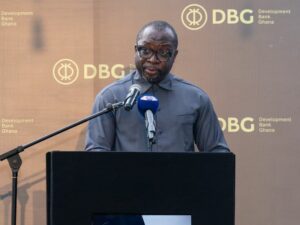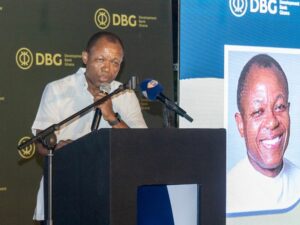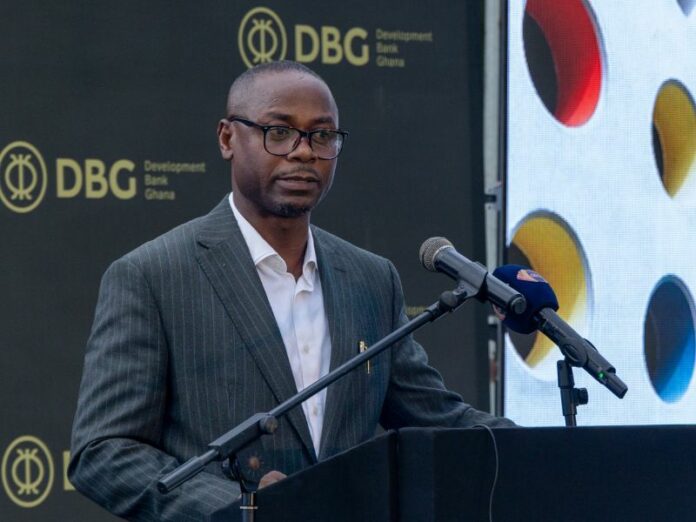Development Bank Ghana (DBG) has secured $70 million to implement a Partial Credit Guarantee scheme to help banks and financial institutions to adequately assess and manage risk. The World Bank is offering $50 million while KfW will provide $20 million for the establishment of the Partial Credit Guarantee (PCG) subsidiary of the Bank.
The Chief Executive Officer (CEO) of DBG, Kwamina Duker, announced this at the DBG and Ghana Association of Banks programme on Ghana’s Medium-Term Outlook in Accra on the theme: “Ghana’s Medium-Term Outlook, Navigating through Economic Uncertainties and an IMF Programme.”
 “We are excited to announce that the Partial Credit Guarantee subsidiary is scheduled to commence operations in the third quarter of the year. This timely launch will provide our Partner Financial Institutions with an additional layer of support, allowing them to better manage risks associated with loan defaults while continuing to serve the Small and Medium Enterprises sector effectively,” Mr. Duker said.
“We are excited to announce that the Partial Credit Guarantee subsidiary is scheduled to commence operations in the third quarter of the year. This timely launch will provide our Partner Financial Institutions with an additional layer of support, allowing them to better manage risks associated with loan defaults while continuing to serve the Small and Medium Enterprises sector effectively,” Mr. Duker said.
Speaking on the topic “The Role of DBG, Working Together to Resuscitate the Country’s Economy,” Mr. Duker said macroeconomic uncertainty was one of the major challenges facing the banking and financial industry.
He said the prevailing macroeconomic conditions such as high inflation, currency depreciation, and fiscal constraints, had created an uncertain business environment, compelling banks to take a more cautious approach to lending and affected the ability of Small and Medium Enterprises (SMEs) to access credit and plan for growth.
“We are determined to address these challenges and build on the strong momentum generated in the first quarter, with a particular focus on expanding our lending portfolio, strengthening relationships with our PFIs and promoting sustainable development,” he said. He said DBG had budgeted to disburse at least GH¢600 million in loans for on-lending to SMEs this year.
“We possess the capacity to provide additional loans to back sustainable projects as they are presented to us, demonstrating our unwavering dedication to growing with our partners. The bank will focus on sectors with high growth potential and significant social and environmental impact, such as agribusiness, manufacturing, and low-carbon and climate-resilient investments,” Mr. Duker, said.
 He said so far DBG had partnered four PFI’s and completed the due diligence and process to onboard Absa and others adding that DBG would continue to identify and onboard new PFIs to enhance the bank’s reach and ability to support SMEs across the country as we seek to have at least 10 PFIs by the end of the year.
He said so far DBG had partnered four PFI’s and completed the due diligence and process to onboard Absa and others adding that DBG would continue to identify and onboard new PFIs to enhance the bank’s reach and ability to support SMEs across the country as we seek to have at least 10 PFIs by the end of the year.
The CEO said DBG in the first quarter of the year increased its lending portfolio by disbursing GH¢57.2 million to three PFIs for lending to businesses in the agriculture and manufacturing sectors, bringing the bank’s loan book size to GH¢302 million.
The CEO of GAB, Mr. John Awuah, in his remarks, said the establishment of DBG was timely and would ensure an increase in loanable funds available to Participating Financial Institutions (PFIs).
He said the DBG and the PFIs had the opportunity to deepen sustainable financing within the larger and productive sectors of the economy, adding that the collaboration of DBG with GAB would ensure banks provided the requisite long-term funding at affordable prices to the business community.
On his part, Professor Eric Osei-Assibey urged banks to support the agricultural and manufacturing sectors to drive economic growth and create employment opportunities for the youth.
Source: GNA









